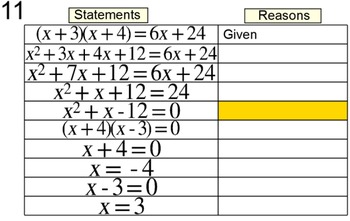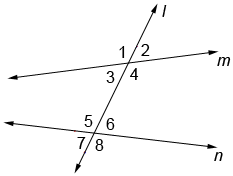The top two boxes and the bottom left box of a proof are these kind of "no hassle" statements we can make
What are gimmies, freebies, or given information
"Everyone who is locked in for the test review will do better. You are locked in right now. You will do better on tomorrow's test."
This is an example of this kind of reasoning:
What is deductive reasoning?
These two kinds of lines lie in the same plane and never intersect.
What are parallel lines?
Saying that segment AB is congruent to segment AB is an example of this property
What is the Reflexive Property?
The measure of these mathematical objects are often represented in degrees
What is an angle?
"Collinear" means that two points lie on the same _______
What is a line?
"Every two angle pairs add up to 90 degrees" can be proven false with the point that Supplementary angles add up to 180 degrees. This is an example of this concept found in basic logic:
What is counterpoint
Lines are coplanar if they contain at least this many non-collinear points
What is three?
This property allows us to change statements from x=4 to 4=x, like a mirror.
What is the Symmetric Property?
These pairs of angles add up to ninety degrees
What are complementary angles?
This reasoning from line 2 is what lets us get to the rest of the proof

What is the subtraction POE?
The next term in the following sequence:
1, 5, 25, 125...
What is 625?
This symbol is shorthand for this for this type of relationship between two lines:
![]()
What is perpendicular?
If angle 1 is congruent to angle 2 AND angle 2 is congruent to angle 3 then this property tells us that angle 1 is congruent to angle 3
What is the Transitive property?
m<1+m<3=180 is an example of an equation using this type of angle relationship.
The reasoning for this yellow box pictured below.
What is the subtraction POE?
Jane has 6 apples on Monday. On Tuesday she has 10 apples. On Wednesday she has 14 apples. On Thursday she has 18 apples. Using inductive reasoning she will have this many apples on Friday.
What are 22 apples?
This mathematical concept is what splits up a line into two equal parts
What is the midpoint/perpendicular bisector?
Given that angles 8 and 4 are congruent *this* statement would use the symmetric property to "flip" around what is said to be a statement that is equally true.

What is angles 4 and 8 are congruent?
We can say that angles 2 and 3 are congruent through this angle relationship (and geometry best friend!)
What are vertical angles
The justification for Step 5 on this diagram would be the following:

What is the Division POE?
P is the midpoint of segment SQ. The following congruence statement can then be made about the two segments:
Segment SP is congruent to Segment PQ
These two lines are this if they are in 3-D space, not intersecting, and not parallel
What are skew lines?
Given that angles 1 and 8 are congruent and angles 8 and 5 are congruent through vertical angles thm. then angles 1 and 5 are congruent through this property
What is the transitive property
Solve for x:
What is 8.18 or 8.2